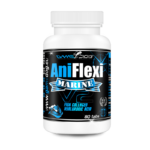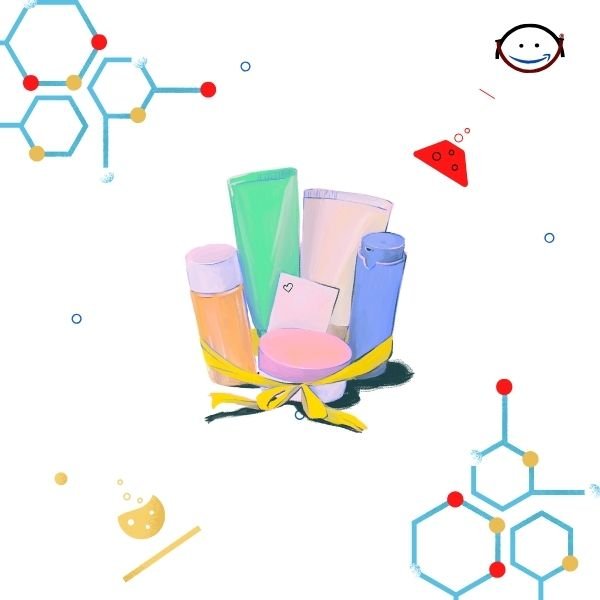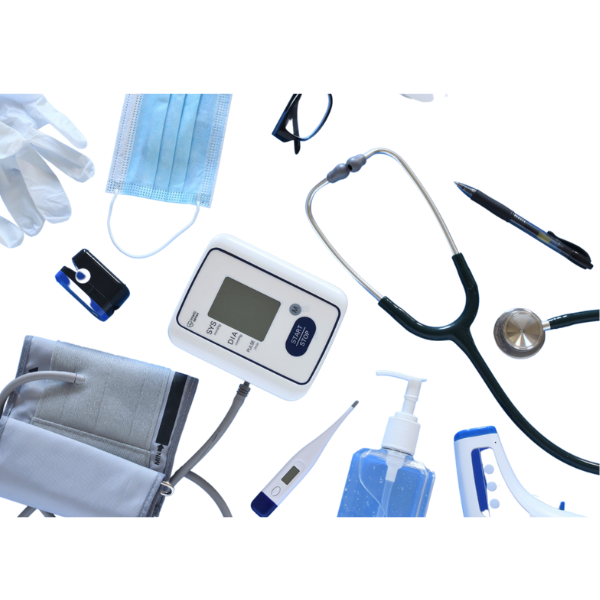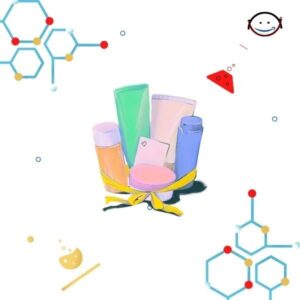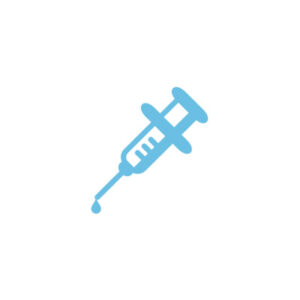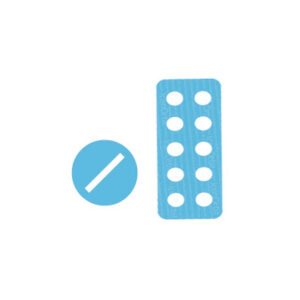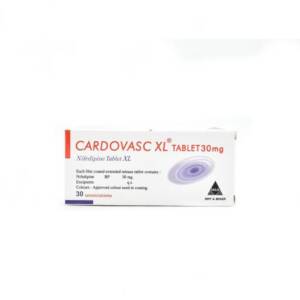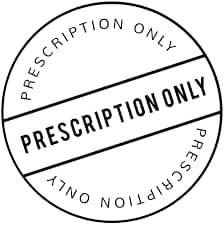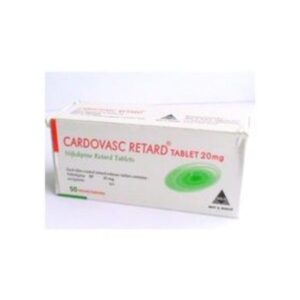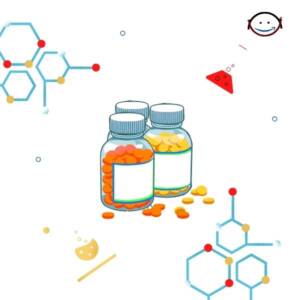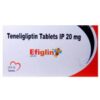-
ABEVIA N TAB 10`S ₦3,454.75 QTY: 1
-
CLINPEU 1% TUBE OF 20GM GEL ₦3,073.25 QTY: 1
-
EFIGLIN 20MG TABLETS 10?S ₦3,426.75 QTY: 1
Customer matched zone "Lagos Delivery Options"
Sort by:
60433–60448 of 358735 Results
-
SaleCardobis 5 mgCardobis 5 mg is indicated in- Hypertension Angina Moderate to severe heart failureTheropeutic ClassAnti adrenergic agent (Beta blockers), Beta-adrenoceptor blocking drugs, Beta-blockersPharmacologyBisoprolol Hemifumarate is the most selective ?1 blocker. It displays highest level of affinity for the ?1 receptor than any other beta-blocker available up to now. Selectively blocks ?1 adrenergic receptor in the heart and vascular smooth muscle and reduces heart rate and cardiac output resulting in decrease of arterial hypertension. Lipid metabolism can be adversely affected by ?-blockers, in patients with non-?1 selective ?1-blocker, but Bisoprolol does not cause any change in the cholesterol fraction including the cardioprotective HDL-cholesterol, in long-term therapy.Dosage & Administration of Cardobis 5 mgHypertension: The dose of Bisoprolol must be individualized to the needs of the patient. The usual starting dose is 5 mg once daily. In some patients, 2.5 mg may be an appropriate starting dose. If the antihypertensive effect of 5 mg is inadequate, the dose may be increased to 10 mg and then, if necessary, to 20 mg once daily. Angina: Usually 10 mg once daily (5 mg may be adequate in some patients) max 20 mg daily. Heart Failure: Initially 1.25 mg once daily (in the morning) for 1 week then, if well tolerated, increased to 2.5 mg once daily for 1 week, then 3.75 mg once daily for 1 week, then 5 mg once daily for 4 weeks, then- 7.5 mg once daily for 4 weeks, then 10 mg once daily maximum 10 mg daily.Interaction of Cardobis 5 mgBisoprolol should not be combined with other ?-blocking agents.ContraindicationsIn patients with cardiogenic shock, overt heart failure, second or third degree A-V block, right ventricular failure secondary to pulmonary hypertension and sinus bradycardia.Side Effects of Cardobis 5 mgGastro-intestinal disturbances, bradycardia, hypotension, headache, fatigue, sleep disturbances, dizziness, vertigo, thrombocytopenia, visual disturbances, alopecia may be occurred.Pregnancy & LactationThe safety of Cardobis 5 mg during pregnancy has not been established.?No data is available for lactation.Precautions & WarningsMonitoring of renal, hepatic and hematopoietic function should be performed at regular intervals during long-term treatment with bisoprolol.Storage ConditionsKeep in a dry place away from light and heat. Keep out of the reach of children.Sku: 1736106774-4249
Cardobis5 mg
₦6,325.00Original price was: ₦6,325.00.₦5,755.75Current price is: ₦5,755.75.₦6,325.00Original price was: ₦6,325.00.₦5,755.75Current price is: ₦5,755.75. Add to basket Quick View -
SaleCardocal 5 mgCardocal 5 mg is indicated for the management of hypertension for end-organ protection. It is reported to be useful in elderly patients and in those with diabetes and albuminuria. Cardocal 5 mg has been increasingly used in patients with chronic kidney diseaseHypertension is the term used to ... Read moreCardocal 5 mg is indicated for the management of hypertension for end-organ protection. It is reported to be useful in elderly patients and in those with diabetes and albuminuria. Cardocal 5 mg has been increasingly used in patients with chronic kidney diseaseHypertension is the term used to describe the presence of high blood pressure. The blood pressure is generated by the force of the blood pumped from the heart against the blood vessels. Thus hypertension is caused when there is too much pressure on the blood vessels and this effect can damage the blood vesselTheropeutic ClassCalcium-channel blockersPharmacologyCardocal 5 mg is a dihydropyridine calcium-channel blocker. Cardocal 5 mg binds to the dihydropy-ridine binding sites of the L-type voltage dependent calcium channel and inhibits Ca2+ influx across the cell membranes of vascular smooth muscle cells via this channel, consequently vascular smooth muscle is relaxed, causing vasodilation. Cardocal 5 mg inhibits Ca2+ influx via N-type voltage dependent calcium channels in the sympathetic nerve cell membrane. The inhibition of Ca2+ influx via N-type voltage dependent calcium channel was observed over a similar range of drug concentrations to those inhibiting L-type voltage dependent Ca2+ channels. Consequently, release of norepinephrine from sympathetic nerve terminals would be inhibited. Cardocal 5 mg is considered to suppress the reflex increase in heart rate after blood pressure reduction.Dosage & Administration of Cardocal 5 mgAdults: 5-10 mg once daily after breakfast. Maximum dose: 20 mg once daily. The safety of Cardocal 5 mg in pediatric patients has not been established.Use in the elderly: Since the elderly may be more susceptible to hypotension, therapy should be initiated with the lowest possible dose (5 mg).Dosage of Cardocal 5 mgAdults: 5-10 mg once daily after breakfast. Maximum dose: 20 mg once daily. Pediatric use: The safety of Cardocal 5 mg in pediatric patients has not been established.Elderly use: Since the elderly may be more susceptible to hypotension, therapy should be initiated with the lowest possible dose (5 mg).Interaction of Cardocal 5 mgOther anti-hypertensive, antipsychotics that cause hypotension, quinidine, carbamazepine, phenytoin, rifampicin, cimetidine, erythromycin.ContraindicationsCardocal 5 mg is contraindicated in patients with known sensitivity to Cardocal 5 mg or any of the excipients or patients having cardiogenic shock, recent MI or acute unstable angina and severe aortic stenosis.Side Effects of Cardocal 5 mgThe most common side effects of Cardocal 5 mg are: Dizziness; flushing; headache; hypotension; peripheral oedema; palpitations; GI disturbances; increased micturition frequency; lethargy; eye pain; depression.Pregnancy & LactationCardocal 5 mg should not be administered in pregnant woman or woman having possibilities of being pregnant. It is also advisable to avoid the administration of Cardocal 5 mg to nursing mothers. However, if the administration is indispensable, the patient should be instructed to discontinue lactation.Precautions & WarningsCardocal 5 mg should be administered with care in the following patients: patients with serious hepatic dysfunction, patients with a history of serious adverse reactions to calcium antagonists. During the discontinuation, the dosage should be gradually decreased under close observation.Storage ConditionsStore below 30?C, protected from light and moisture. Keep away from reach out of the children.Drug ClassesCalcium-channel blockersMode Of ActionCardocal 5 mg is a dihydropyridine calcium-channel blocker. Cardocal 5 mg binds to the dihydropy-ridine binding sites of the L-type voltage dependent calcium channel and inhibits Ca2+ influx across the cell membranes of vascular smooth muscle cells via this channel, consequently vascular smooth muscle is relaxed, causing vasodilation. Cardocal 5 mg inhibits Ca2+ influx via N-type voltage dependent calcium channels in the sympathetic nerve cell membrane. The inhibition of Ca2+ influx via N-type voltage dependent calcium channel was observed over a similar range of drug concentrations to those inhibiting L-type voltage dependent Ca2+ channels. Consequently, release of norepinephrine from sympathetic nerve terminals would be inhibited. Cardocal 5 mg is considered to suppress the reflex increase in heart rate after blood pressure reduction.PregnancyCardocal 5 mg should not be administered in pregnant woman or woman having possibilities of being pregnant. It is also advisable to avoid the administration of Cardocal 5 mg to nursing mothers. However, if the administration is indispensable, the patient should be instructed to discontinue lactation.Sku: 1736091051-19
Cardocal5 mg
₦3,850.00Original price was: ₦3,850.00.₦3,465.00Current price is: ₦3,465.00.₦3,850.00Original price was: ₦3,850.00.₦3,465.00Current price is: ₦3,465.00. Add to basket Quick View -
SaleCardofix 2.5 mg + 5 mgBisoprolol plus Hydrochlorothiazide is indicated in the treatment of Hypertension.Theropeutic ClassCombined antihypertensive preparationsPharmacologyBisoprolol Fumarate and Hydrochlorothiazide have been used individually and in combination for the treatment of hypertension. The antihypertensive effects of these agents are additive; Hydrochlorothiazide 6.25 mg significantly increases the antihypertensive effect of Bisoprolol Fumarate. The incidence of hypokalemia with the Bisoprolol Fumarate and Hydrochlorothiazide 6.25 mg combination is significantly lower than with Hydrochlorothiazide 25 mg. Bisoprolol Fumarate is a ?1-selective (cardioselective) adrenoceptor blocking agent without significant membrane stabilizing or intrinsic sympathomimetic activities in its therapeutic dose range. Hydrochlorothiazide is a benzothiadiazine diuretic. Thiazides affect renal tubular mechanisms of electrolyte reabsorption and increase excretion of sodium and chloride in approximately equivalent amountsDosage & Administration of Cardofix 2.5 mg + 5 mgBisoprolol is an effective treatment of hypertension in once-daily doses of 2.5 to 40 mg, while Hydrochlorothiazide is effective in doses of 12.5 to 50 mg. In clinical trials of Bisoprolol/Hydrochlorothiazide combination therapy using Bisoprolol doses of 2.5 to 20 mg and Hydrochlorothiazide doses of 6.25 to 25 mg, the antihypertensive effects increased with increasing doses of either component. Initial Therapy: Antihypertensive therapy may be initiated with the lowest dose of this conbination, one 2.5/6.25 mg tablet once daily. Subsequent titration (14 day intervals) may be carried out with this tablets up to the maximum recommended dose 20/12.5 mg once daily, as appropriate. Replacement Therapy: The combination may be substituted for the titrated individual components. Therapy Guided by Clinical Effect: A patient whose blood pressure is not adequately controlled with 2.5-20 mg Bisoprolol daily may instead be given this conbination. Patients whose blood pressures are adequately controlled with 50 mg of hydrochlorothiazide daily, but who experience significant potassium loss with this regimen, may achieve similar blood pressure control without electrolyte disturbance if they are switched to this conbination.Dosage of Cardofix 2.5 mg + 5 mgBisoprolol is an effective treatment of hypertension in once-daily doses of 2.5 to 40 mg, while Hydrochlorothiazide is effective in doses of 12.5 to 50 mg. In clinical trials of Bisoprolol/Hydrochlorothiazide combination therapy using Bisoprolol doses of 2.5 to 20 mg and Hydrochlorothiazide doses of 6.25 to 25 mg, the antihypertensive effects increased with increasing doses of either component. Initial Therapy: Antihypertensive therapy may be initiated with the lowest dose of this conbination, one 2.5/6.25 mg tablet once daily. Subsequent titration (14 day intervals) may be carried out with this tablets up to the maximum recommended dose 20/12.5 mg once daily, as appropriate. Replacement Therapy: The combination may be substituted for the titrated individual components. Therapy Guided by Clinical Effect: A patient whose blood pressure is not adequately controlled with 2.5-20 mg Bisoprolol daily may instead be given this conbination. Patients whose blood pressures are adequately controlled with 50 mg of hydrochlorothiazide daily, but who experience significant potassium loss with this regimen, may achieve similar blood pressure control without electrolyte disturbance if they are switched to this conbination.Interaction of Cardofix 2.5 mg + 5 mgThis combination drug may potentiate the action of other antihypertensive agents used concomitantly. This combination drug should not be combined with other beta-blocking agents. Patients receiving catecholamine-depleting drugs, such as reserpine or guanethidine, should be closely monitored because the added beta-adrenergic blocking action of Bisoprolol Fumarate may produce excessive reduction of sympathetic activity. In patients receiving concurrent therapy with clonidine, if therapy is to be discontinued, it is suggested that this combination drug be discontinued for several days before the withdrawal of clonidine. This combination drug should be used with caution when myocardial depressants or inhibitors of AV conduction, such as certain calcium antagonists (particularly of the phenylalkylamine [verapamil] and benzothiazepine [diltiazem] classes) or antiarrhythmic agents, such as disopyramide, are used concurrently. Both digitalis glycosides and beta-blockers slow atrioventricular conduction and decrease heart rate. Concomitant use can increase the risk of bradycardia.ContraindicationsIt is contraindicated in patients in cardiogenic shock, overt cardiac failure, second or third degree AV block, marked sinus bradycardia, anuria and hypersensitivity to either component of this product or to other sulfonamide-derived drugs.Side Effects of Cardofix 2.5 mg + 5 mgGenerally well tolerated. Most side effects have been mild and transient. Side effects which may occur: fatigue, dizziness, headache, bradycardia, arrhythmia, peripheral ischemia, chest pain, palpitations, rhythm disturbances, cold extremities, claudication, orthostatic hypotension, diarrhoea, constipation, nausea, dyspepsia, rhinitis, pharyngitis etc.Pregnancy & LactationUse in Pregnancy: Pregnancy Category C. There are no adequate and well-controlled studies in pregnant women. Bisoprolol Fumarate and Hydrochlorothiazide should be used during pregnancy only if the potential benefit justifies the risk to the fetus. Use in Nursing Mothers: Bisoprolol Fumarate alone or in combination with Hydrochlorothiazide has not been studied in nursing mothers. Thiazides are excreted in human breast milk. Small amounts of Bisoprolol Fumarate have been detected in the milk of lactating rats. Because of the potential for serious adverse reactions in nursing infants, a decision should be made whether to discontinue nursing or to discontinue the drug, taking into account the importance of the drug to the mother.Precautions & WarningsHyperuricemia or acute gout may be precipitated in certain patients receiving thiazide diuretics. Warning signs or symptoms of fluid and electrolyte imbalance include dryness of mouth, thirst, weakness, lethargy, drowsiness, restlessness, muscle pains or cramps, muscular fatigue, hypotension, oliguria, tachycardia and gastrointestinal disturbances such as nausea and vomiting. Hypokalemia may develop. If withdrawal of this combination therapy is planned, it should be achieved gradually over a period of about 2 weeks. Patients should be carefully observed.Overdose Effects of Cardofix 2.5 mg + 5 mgThere are limited data on overdose with this combination product. The most frequently observed signs expected with overdosage of a beta-blocker are bradycardia and hypotension. Lethargy is also common and with severe overdoses, delirium, coma, convulsions, and respiratory arrest have been reported to occur. Congestive heart failure, bronchospasm, and hypoglycemia may occur. With thiazide diuretics, acute intoxication is rare. The most prominent feature of overdose is acute loss of fluid and electrolytes. Signs and symptoms include cardiovascular (tachycardia, hypotension, shock), neuromuscular (weakness, confusion, dizziness, cramps of the calf muscles, paresthesia, fatigue, impairment of consciousness), gastrointestinal (nausea, vomiting, thirst), renal (polyuria, oliguria, or anuria), and laboratory findings (hypokalemia, hyponatremia, hypochloremia, alkalosis, increased BUN [especially in patients with renal insufficiency]).Storage ConditionsKeep below 30?C temperature, away from light & moisture. Keep out of the reach of children.Drug ClassesCombined antihypertensive preparationsMode Of ActionBisoprolol Fumarate and Hydrochlorothiazide have been used individually and in combination for the treatment of hypertension. The antihypertensive effects of these agents are additive; Hydrochlorothiazide 6.25 mg significantly increases the antihypertensive effect of Bisoprolol Fumarate. The incidence of hypokalemia with the Bisoprolol Fumarate and Hydrochlorothiazide 6.25 mg combination is significantly lower than with Hydrochlorothiazide 25 mg. Bisoprolol Fumarate is a ?1-selective (cardioselective) adrenoceptor blocking agent without significant membrane stabilizing or intrinsic sympathomimetic activities in its therapeutic dose range. Hydrochlorothiazide is a benzothiadiazine diuretic. Thiazides affect renal tubular mechanisms of electrolyte reabsorption and increase excretion of sodium and chloride in approximately equivalent amountsPregnancyUse in Pregnancy: Pregnancy Category C. There are no adequate and well-controlled studies in pregnant women. Bisoprolol Fumarate and Hydrochlorothiazide should be used during pregnancy only if the potential benefit justifies the risk to the fetus. Use in Nursing Mothers: Bisoprolol Fumarate alone or in combination with Hydrochlorothiazide has not been studied in nursing mothers. Thiazides are excreted in human breast milk. Small amounts of Bisoprolol Fumarate have been detected in the milk of lactating rats. Because of the potential for serious adverse reactions in nursing infants, a decision should be made whether to discontinue nursing or to discontinue the drug, taking into account the importance of the drug to the mother.Sku: 1736096589-1257
Cardofix2.5 mg + 5 mg
₦3,300.00Original price was: ₦3,300.00.₦2,970.00Current price is: ₦2,970.00.₦3,300.00Original price was: ₦3,300.00.₦2,970.00Current price is: ₦2,970.00. Add to basket Quick View -
-
SaleCardon 25 mgHypertension: It is recommended to use Cardon 25 mg to treat hypertension. It could be used with other antihypertensive medications or taken alone (eg. thiazide diuretics). Renal Protection in Type-2 Diabetic Patients with Proteinuria: In hypertensive type-2 diabetics with proteinuria, which is defined as urine albumin to creatinine ratio >300 mg/g, Cardon 25 mg is advised to postpone the advancement of renal disease.Theropeutic ClassAngiotensin-ll receptor blockerPharmacologyThe first angiotensin II receptor blocker that is orally active without a peptide is Cardon 25 mg. It binds to the AT1 receptor, which is present in numerous tissues (such as the heart, kidneys, adrenal glands, and vascular smooth muscle), and inhibits several critical biological processes, such as vasoconstriction and the production of the hormone aldosterone that causes hypertension.Dosage & Administration of Cardon 25 mgFor the majority of patients, the beginning and maintenance dose is 50 mg once daily. Prior to raising the dose, 25 mg twice daily is advised if the antihypertensive impact of 50 mg once daily is insufficient. A starting dose of 25 mg once daily should be taken into consideration for individuals with intravascular volume depletion (such as those on high-dose diuretics). One or two doses of Cardon 25 mg can be given each day. From 25 mg to 100 mg is the range for the total daily dose.Dosage of Cardon 25 mgFor the majority of patients, the beginning and maintenance dose is 50 mg once daily. Prior to raising the dose, 25 mg twice daily is advised if the antihypertensive impact of 50 mg once daily is insufficient. A starting dose of 25 mg once daily should be taken into consideration for individuals with intravascular volume depletion (such as those on high-dose diuretics). One or two doses of Cardon 25 mg can be given each day. From 25 mg to 100 mg is the range for the total daily dose.Interaction of Cardon 25 mgLevels of the Cardon 25 mg active metabolite are decreased by rifampicin and fluconazole. The antihypertensive effects of hydrochlorothiazide and Cardon 25 mg used together may be potentiated. Increases in serum potassium may result from the concurrent use of potassium-sparing diuretics (such as spironolactone, triamterene, and amiloride), potassium supplements, or salt substitutes containing potassium. The non-steroidal anti-inflammatory medicine indomethacin may lessen the antihypertensive effects of losartan. The risk of renal impairment is increased by the concurrent use of an ACE inhibitor, an angiotensin receptor antagonist, an anti-inflammatory medication, and a thiazide diuretic.ContraindicationsPregnant women and individuals who are hypersensitive to any ingredient in this medication should not use Cardon 25 mg. Those with diabetes shouldn't take Aliskiren and Cardon 25 mg together.Side Effects of Cardon 25 mgCardon 25 mg side effects are minor and short-lived in nature. Dizziness, diarrhea, nasal congestion, coughing, and upper respiratory infections are the most frequent adverse effects. Fatigue, oedema, chest pain, nausea, headaches, and pharyngitis are other adverse effects.Pregnancy & LactationCategory D for pregnancies. If Cardon 25 mg is given during the second or third trimester of pregnancy, the risk to the fetus increases. Given that numerous medicines are excreted in human milk and that it is unknown whether Cardon 25 mg is one of them, a choice should be taken regarding whether to stop breastfeeding or stop taking the medication, taking into account the significance of the medication to the mother.Precautions & WarningsIn addition to increasing fetal and neonatal morbidity and mortality, the use of Cardon 25 mg throughout the second and third trimesters of pregnancy decreases fetal renal function. Symptomatic hypotension may happen in people who are intravascularly volume-depleted (such as those taking high-dose diuretics). Patients with cirrhosis have a considerably higher plasma concentration of Cardon 25 mg. Patients with renal impairment have experienced changes in renal function, including renal failure.Storage ConditionsKeep dry and away from heat and light. Keep out of children's reach.Drug ClassesAngiotensin-ll receptor blockerMode Of ActionThe first angiotensin II receptor blocker that is orally active without a peptide is Cardon 25 mg. It binds to the AT1 receptor, which is present in numerous tissues (such as the heart, kidneys, adrenal glands, and vascular smooth muscle), and inhibits several critical biological processes, such as vasoconstriction and the production of the hormone aldosterone that causes hypertension.PregnancyCategory D for pregnancies. If Cardon 25 mg is given during the second or third trimester of pregnancy, the risk to the fetus increases. Given that numerous medicines are excreted in human milk and that it is unknown whether Cardon 25 mg is one of them, a choice should be taken regarding whether to stop breastfeeding or stop taking the medication, taking into account the significance of the medication to the mother.Sku: 1736097693-1576
Cardon25 mg
₦3,300.00Original price was: ₦3,300.00.₦3,003.00Current price is: ₦3,003.00.₦3,300.00Original price was: ₦3,300.00.₦3,003.00Current price is: ₦3,003.00. Add to basket Quick View -
SaleCardon 50 mgHypertension: It is recommended to use Cardon 50 mg to treat hypertension. It could be used with other antihypertensive medications or taken alone (eg. thiazide diuretics). Renal Protection in Type-2 Diabetic Patients with Proteinuria: In hypertensive type-2 diabetics with proteinuria, which is defined as urine albumin to creatinine ratio >300 mg/g, Cardon 50 mg is advised to postpone the advancement of renal disease.Theropeutic ClassAngiotensin-ll receptor blockerPharmacologyThe first angiotensin II receptor blocker that is orally active without a peptide is Cardon 50 mg. It binds to the AT1 receptor, which is present in numerous tissues (such as the heart, kidneys, adrenal glands, and vascular smooth muscle), and inhibits several critical biological processes, such as vasoconstriction and the production of the hormone aldosterone that causes hypertension.Dosage & Administration of Cardon 50 mgFor the majority of patients, the beginning and maintenance dose is 50 mg once daily. Prior to raising the dose, 25 mg twice daily is advised if the antihypertensive impact of 50 mg once daily is insufficient. A starting dose of 25 mg once daily should be taken into consideration for individuals with intravascular volume depletion (such as those on high-dose diuretics). One or two doses of Cardon 50 mg can be given each day. From 25 mg to 100 mg is the range for the total daily dose.Dosage of Cardon 50 mgFor the majority of patients, the beginning and maintenance dose is 50 mg once daily. Prior to raising the dose, 25 mg twice daily is advised if the antihypertensive impact of 50 mg once daily is insufficient. A starting dose of 25 mg once daily should be taken into consideration for individuals with intravascular volume depletion (such as those on high-dose diuretics). One or two doses of Cardon 50 mg can be given each day. From 25 mg to 100 mg is the range for the total daily dose.Interaction of Cardon 50 mgLevels of the Cardon 50 mg active metabolite are decreased by rifampicin and fluconazole. The antihypertensive effects of hydrochlorothiazide and Cardon 50 mg used together may be potentiated. Increases in serum potassium may result from the concurrent use of potassium-sparing diuretics (such as spironolactone, triamterene, and amiloride), potassium supplements, or salt substitutes containing potassium. The non-steroidal anti-inflammatory medicine indomethacin may lessen the antihypertensive effects of losartan. The risk of renal impairment is increased by the concurrent use of an ACE inhibitor, an angiotensin receptor antagonist, an anti-inflammatory medication, and a thiazide diuretic.ContraindicationsPregnant women and individuals who are hypersensitive to any ingredient in this medication should not use Cardon 50 mg. Those with diabetes shouldn't take Aliskiren and Cardon 50 mg together.Side Effects of Cardon 50 mgCardon 50 mg side effects are minor and short-lived in nature. Dizziness, diarrhea, nasal congestion, coughing, and upper respiratory infections are the most frequent adverse effects. Fatigue, oedema, chest pain, nausea, headaches, and pharyngitis are other adverse effects.Pregnancy & LactationCategory D for pregnancies. If Cardon 50 mg is given during the second or third trimester of pregnancy, the risk to the fetus increases. Given that numerous medicines are excreted in human milk and that it is unknown whether Cardon 50 mg is one of them, a choice should be taken regarding whether to stop breastfeeding or stop taking the medication, taking into account the significance of the medication to the mother.Precautions & WarningsIn addition to increasing fetal and neonatal morbidity and mortality, the use of Cardon 50 mg throughout the second and third trimesters of pregnancy decreases fetal renal function. Symptomatic hypotension may happen in people who are intravascularly volume-depleted (such as those taking high-dose diuretics). Patients with cirrhosis have a considerably higher plasma concentration of Cardon 50 mg. Patients with renal impairment have experienced changes in renal function, including renal failure.Storage ConditionsKeep dry and away from heat and light. Keep out of children's reach.Drug ClassesAngiotensin-ll receptor blockerMode Of ActionThe first angiotensin II receptor blocker that is orally active without a peptide is Cardon 50 mg. It binds to the AT1 receptor, which is present in numerous tissues (such as the heart, kidneys, adrenal glands, and vascular smooth muscle), and inhibits several critical biological processes, such as vasoconstriction and the production of the hormone aldosterone that causes hypertension.PregnancyCategory D for pregnancies. If Cardon 50 mg is given during the second or third trimester of pregnancy, the risk to the fetus increases. Given that numerous medicines are excreted in human milk and that it is unknown whether Cardon 50 mg is one of them, a choice should be taken regarding whether to stop breastfeeding or stop taking the medication, taking into account the significance of the medication to the mother.Sku: 1736106037-4028
Cardon50 mg
₦5,500.00Original price was: ₦5,500.00.₦5,005.00Current price is: ₦5,005.00.₦5,500.00Original price was: ₦5,500.00.₦5,005.00Current price is: ₦5,005.00. Add to basket Quick View -
-
-
SaleCardotel 5 mg+40 mgThis combination is used for the treatment of essential hypertension in adults. Replacement Therapy:?Patients receiving telmisaitan and amlodipine from separate tablets may instead receive Telmisartan & Amlodipine containing the same component doses.Add-On Therapy: Telmisartan & Amlodipine is indicated in patients whose blood pressure is not adequately controlled on telmisaitan or amlodipine monotherapy.Initial Therapy:?Telmisartan & Amlodipine may also be used as initial therapy in patients who are likely to need multiple drugs to achieve their blood pressure goals. Base the choice of Telmisartan & Amlodipine tablets as initial therapy for hypertension on an assessment of potential benefits and risks including whether the patient is likely to tolerate the starting dose of Telmisartan & Amlodipine tablets.Patients with moderate or severe hypeitension are at relatively high-risk for cardiovascular events (eg, stroke, heait attacks and heart failure), kidney failure and vision problems, so prompt treatment is clinically relevant. Consider the patient?s baseline blood pressure, the target goals and the incremental likelihood of achieving goals with a combination compared to monotherapy when deciding whether to use Telmisartan & Amlodipine tablets as initial therapy. Individual blood pressure goals may vary based upon the patient?s risk.Theropeutic ClassCombined antihypertensive preparationsPharmacologyAmlodipine relaxes peripheral and coronary vascular smooth muscle. It produces coronary vasodilation by inhibiting the entry of Ca ions into the slow channels or select voltage sensitive channels of the vascular smooth muscle and myocardium during depolarisation. It also increases myocardial oxygen delivery in patients with vasospastic angina.Telmisartan is a nonpeptide ATI angiotensin II receptor antagonist. It exerts antihypertensive activity by preventing angiotensin II from binding to ATI receptors thus inhibiting the vasoconstricting and aldosterone-secreting effects of angiotensin II.Dosage & Administration of Cardotel 5 mg+40 mgEach tablet contains Telmisartan 40 mg & Amlodipine 5 mg ?Adults: One tablet should be taken once daily. Maximum Recommendation Dose: two tablets/day.Replacement Therapy: Patients receiving telmisartan and amlodipine from separate tab can instead receive. Telmisartan & Amlodipine containing the same component doses in 1 tablet once daily eg, to enhance convenience or compliance.Add-On Therapy:?Telmisartan & Amlodipine may be administered in patients whose blood pressure is not adequately controlled with amlodipine or telmisartan alone. Patients treated with amlodipine 10 mg who experience any dose-limiting adverse reactions eg, oedema, may be switched to Telmisartan & Amlodipine 40/5 mg once daily, reducing the dose of amlodipine without reducing the overall ected antihypertensive response.Individual dose titration with the components (ie, am odipine and telmisaitan) is recommended before changing to the fixed-dose combination. When clinically appropriate, direct change from monotherapy to the fixed-dose combination may be considered.Initial Therapy:?A patient may be initiated on Telmisartan & Amlodipine if it is unlikely that control of blood pressure would be achieved with a single agent.Usual Starting Dose: 40/5 mg once daily. Initial therapy with Telmisartan & Amlodipine is not recommended in patients 75 years or with hepatic impairment. Correct imbalances on intravascular volume- or salt-depletion, before initiating therapy with Telmisartan & Amlodipine tablet. Telmisartan & Amlodipine may be taken with or without food.Children and Adolescents: Telmisartan & Amlodipine is not recommended for use in patients below 18 years due to a lack of data on safety and efficacy.Elderly:?No dose adjustment is necessary for elderly patients. Limited information is available in the very elderly patients.Interaction of Cardotel 5 mg+40 mgNo interactions between the 2 components of this fixed-dose combinations have been observed in clinical studies. Interactions Common to the Combination: No drug interaction studies have been performed with Telmisartan & Amlodipine and other medicinal products.ContraindicationsHypersensitivity to telmisartan, amlodipine, dihydropyridine derivatives or to any of the excipients of Telmisartan & Amlodipine. Biliary obstructive disorders, severe hepatic impairment & hypotension, cardiogenic shock, left ventricle outflow tract obstuction, haemodynamically unstable heart failure after acute MI.Side Effects of Cardotel 5 mg+40 mgThe most common adverse reactions include Dizziness, peripheral oedema. Somnolence, migraine, headache, paraesthesia, vertigo, bradycardia, palpitations, hypotension, orthostatic hypotension, flushing, cough, abdominal pain, diarrhoea, nausea, pruritus, arthralgia, muscle spasms, myalgia, erectile dysfunction, asthenia, chest pain, fatigue, oedema, increased hepatic enzyme.Pregnancy & LactationPregnancy: Category D. There is positive evidence of human foetal risk, but the benehts from use in pregnant women may be acceptable despite the risk (e.g., if the drug is needed in a life threatening situation or for a serious disease for which safer drugs cannot be used or are ineffective).Use in lactation:?It is not known whether telmisartan and/or amlodipine are excreted in human milk. Animal studies have shown excretion of telmisartan in breast milk. Because of the potential adverse reactions in nursing infants, a decision should be made whether to discontinue nursing or to discontinue therapy, taking into account the importance of this therapy for the motherPrecautions & WarningsHepatic & renal impairment, renovascular HTN, intravascular hypovolaemia, severe CHE renal artery stenosis, primary aldosteronism, aortic or mitral valve stenosis, obstructive hypertrophic cardiomyopathy, NYHA III & IV heart failure of non-ischaemic aetiology, hyperkalaemia. Fructose intolerance. May impair ability to drive or operate machinery. Children & adolescent 18 years.Impairment of Fertility: No data from controlled clinical studies with the fixed dose combination or with the individual components are available.Separate reproductive toxicity studies with the combination of telmisartan and amlodipine have not been conducted. In preclinical studies, no effects of telmisartan on male and female fertility were observed.? Similarly, no effects on male and female fertility were reported for amlodipine.Storage ConditionsStore in a cool and dry place, protected from light. Keep out of children?s reach.Sku: 1736100550-2419
Cardotel5 mg+40 mg
₦9,625.00Original price was: ₦9,625.00.₦8,662.50Current price is: ₦8,662.50.₦9,625.00Original price was: ₦9,625.00.₦8,662.50Current price is: ₦8,662.50. Add to basket Quick View -
-
-
SaleTreatment of High Blood Pressure Treatment of Angina Active Ingredient: Nifedipine 20mgSku: 105133-1
Cardovasc Retard 20mg Nifedipine Tablets, 50 Tablets
₦2,400.00Original price was: ₦2,400.00.₦1,700.00Current price is: ₦1,700.00.₦2,400.00Original price was: ₦2,400.00.₦1,700.00Current price is: ₦1,700.00. Add to basket Quick View -
